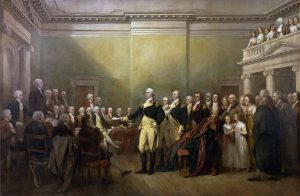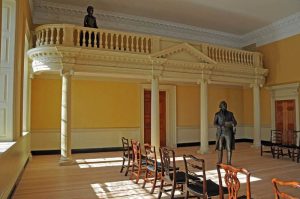On a cold December afternoon in 1783, an extraordinary event took place in Annapolis, Maryland – one that would shape the very foundation of American democracy. General George Washington, commander of the victorious Continental Army, voluntarily surrendered his power to Congress. This unprecedented act would echo through centuries of American history and democratic tradition.
Setting the Stage
The Maryland State House in Annapolis served as the temporary capital of the newly independent United States. On December 23, the Continental Congress assembled in the Senate Chamber, anticipating what would become one of the most significant moments in American history. The chamber was filled with delegates, spectators, and a sense of momentous occasion. Among those present was Thomas Jefferson.

At noon, Washington entered the Senate Chamber. Contemporary accounts describe him as appearing both dignified and nervous – the great general clearly moved by the gravity of the moment. He had prepared a short speech, later known as his ‘Resignation Address’. Rising before Congress, Washington’s voice trembled with emotion as he began his address. His words were carefully chosen, reflecting both humility and pride in the nation’s achievement:
“Happy in the confirmation of our Independence and Sovereignty, and pleased with the opportunity afforded the United States of becoming a respectable Nation, I resign with satisfaction the Appointment I accepted with diffidence.”
The General’s voice notably shook as he added a personal note about “bidding a final farewell to the interests of public life, and to take my leave of the great theater of Action.”
After completing his address, Washington reached into his coat and withdrew his commission – the same document Congress had given him in 1775. He handed it to Thomas Mifflin, President of Congress, symbolically returning the power entrusted to him years before. When King George III heard of Washington’s intent to resign and return to private life, he reportedly told the painter Benjamin West: “If he does that, he will be the greatest man in the world.” The king, like many, understood that Washington could have easily used his military power and popularity to establish himself as a monarch or dictator.
Now a civilian, Washington left Annapolis, crossed the South River by ferry and returned to his home at Mount Vernon.
The Legacy

Washington’s resignation established several crucial precedents:
- The principle of civilian control over the military
- The peaceful transfer of power
- The rejection of military dictatorship
- The supremacy of democratic government over individual power
Today, the Senate Chamber in the Maryland State House stands preserved much as it appeared on that December day. The room where Washington set this crucial precedent remains a powerful reminder of one man’s commitment to democratic principles over personal power.
This moment, perhaps more than any other, cemented Washington’s reputation as a true champion of republican government. When the nation needed its first president under the new Constitution, it turned unanimously to the man who had proven he could be trusted with power – because he had willingly given it up. Washington’s resignation at Annapolis represents more than just a ceremonial transfer of power. It embodies the very essence of American democracy – the idea that power flows from the people through their elected representatives, not from the barrel of a gun or the divine right of kings. In an era when military leaders often seized power for themselves, Washington chose a different path. His decision to surrender his sword to civil authority set a precedent that has guided American civil-military relations for over two centuries. It stands as one of the most important moments in the establishment of American democracy, demonstrating that in the United States, principles would triumph over personality, and law would prevail over force.
The echoes of that December day in Annapolis continue to resonate through American history, reminding us that true greatness often lies not in seizing power, but in knowing when to let it go.
